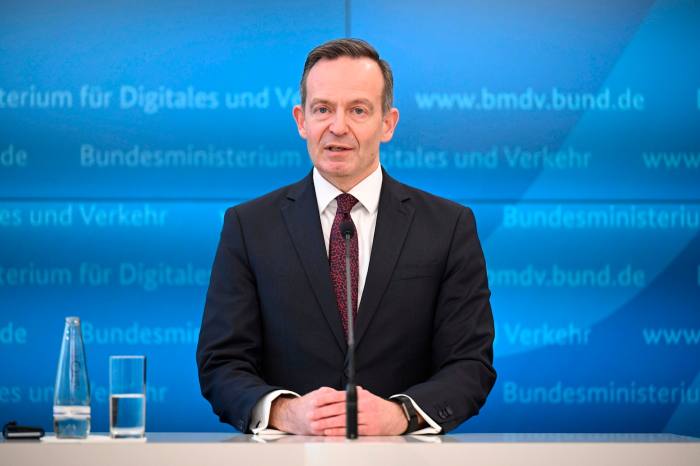Germany’s transport minister has threatened to block a core part of the EU’s green agenda, saying Berlin would not support plans to effectively ban new cars with internal combustion engines from 2035 unless Brussels exempts vehicles running on synthetic fuels.
Volker Wissing said the production of engines that use “climate-friendly” e-fuels, such as e-methane and e-kerosene, “must be allowed on a permanent basis”.
The declaration comes days ahead of an EU vote on plans to force European automakers to cut their cars’ carbon emissions by 55 per cent between 2021 and 2030, and 100 per cent by 2035.
Wissing called for the European Commission to make a proposal to allow for the production of combustion engines running on synthetic fuels beyond 2035 or face a backlash from Berlin.
The vote is set for next Tuesday.

Without Berlin’s backing, the law will not pass. Poland has already stated its opposition, while Bulgaria has said it will abstain.
Following Wissing’s intervention, Italy’s energy ministry said on Tuesday that Rome would also obstruct the plans.
Environmental targets should “avoid negative repercussions for the country both in terms of employment and production”, it said in a statement.
Matteo Salvini, Italy’s deputy prime minister and leader of the League party, took credit for pushing Italy to resist Brussels on the combustion engine ban.
“Yes to environmental sustainability but with common sense, avoiding giving China entire industries and hundreds of thousands of jobs,” Salvini tweeted.
The EU plan, which was provisionally agreed upon by member states last year, will effectively make it impossible to sell new petrol or diesel vehicles from 2035.
That has made it highly controversial in Germany, where hundreds of thousands of jobs in the automotive sector could be affected by an effective ban on vehicles with combustion engines, which contain many more components — and take much more labour to construct — than electric vehicles.
However, Frans Timmermans, the EU’s commissioner for the Green Deal, has been critical of the environmental benefits of e-fuels, leading to concerns in Berlin that the commission will not make allowances for them when it reviews the legislation in 2025.
The EU’s de facto ban on combustion engines has become major source of contention in the three-way governing coalition of Germany’s Social Democrat chancellor Olaf Scholz. The Greens support an EU-wide ban, but it is opposed by Wissing’s party, the pro-market Free Democrats (FDP).
Green ministers in the government reacted with dismay to Wissing’s intervention. A spokesman for the environment ministry, which is run by the Greens, said Germany had approved the phaseout of combustion engines when EU ambassadors discussed it in November.
“This assent was co-ordinated with other ministries,” the spokesman said. The text that was supposed to be confirmed next week “hadn’t changed”.
FDP leader Christian Lindner, who is also the German finance minister, said last year that banning the combustion engine in Europe would only prompt manufacturers to move elsewhere in the world to fill the gap.
Germany had initially agreed to the phaseout last year on condition the commission launched a review into whether cars that run on climate-friendly fuels like e-fuels could be permitted after 2035. E-fuels are produced using electricity from renewable hydrogen and other gases, and so are often considered “carbon neutral”.
However, e-fuels are not yet widely available and require vast amounts of renewable energy to produce.
In addition, campaigners say they can be almost as noxious as burning fossil fuels and they emit as much poisonous nitrogen oxides as petrol-powered engines.
Greenpeace accused Wissing of risking the German government’s reputation in the EU. Benjamin Stephan, a Greenpeace transport expert, told the DPA news agency that the transport minister “doesn’t want to acknowledge what the commission and parliament decided a long time ago and even the auto industry has long accepted: e-fuels are a waste of electricity.”
Climate Capital

Where climate change meets business, markets and politics. Explore the FT’s coverage here.
Are you curious about the FT’s environmental sustainability commitments? Find out more about our science-based targets here
On the same day as Wissing’s intervention, the Scholz government said it would change the law to allow e-fuels to be used in cars in Germany.
The FDP described the decision as a “breakthrough” in efforts to protect the climate. “It means that all cars with combustion engines will be able to run on these fuels in pure form,” said Christian Dürr, leader of the FDP group in the German parliament.
“In future it will be possible for normal cars with combustion engines to run on carbon-neutral fuels,” he said. “Up to now that was not legally possible.”
Additional reporting by Amy Kazmin in Rome

